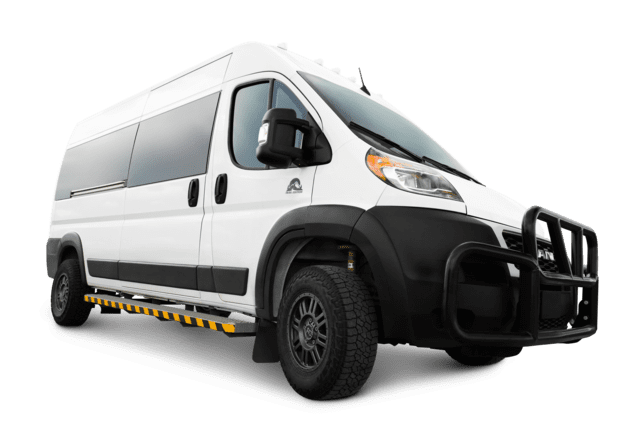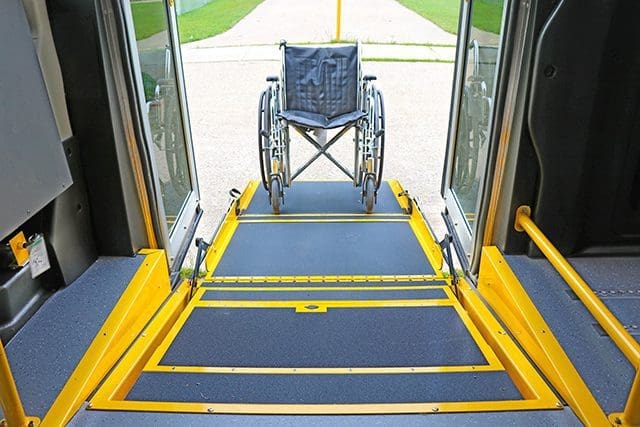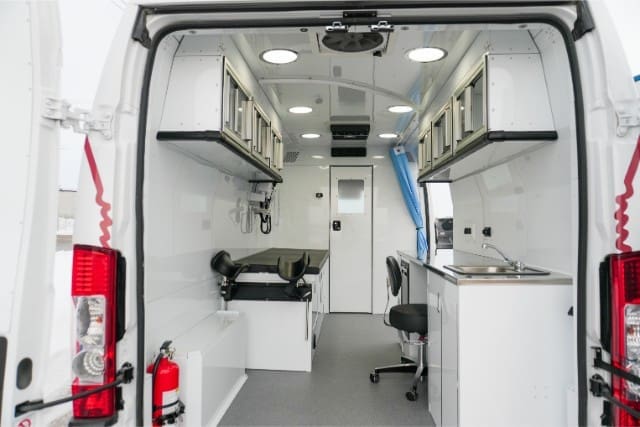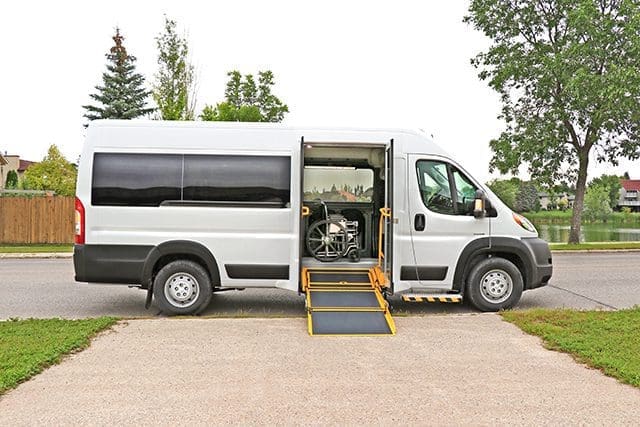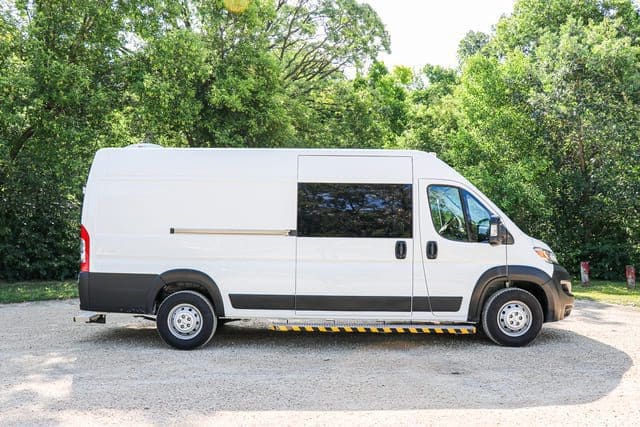Did you know Canada has some of the coldest winters in the world? Temperatures can drop to -40°C or even lower with the windchill. If your organization plans to run a mobile clinic in winter, you can run into problems if you’re not prepared. Doors might freeze shut, your heat can stop working, and medical supplies might get damaged. These issues can slow your operations down and potentially even stop your clinic from helping the people who need serious help.
Now picture this: your mobile clinic running smoothly, no matter how cold it gets outside. Patients stay warm, your team feels confident, and the equipment works the way it should.
At MoveMobility, we’ve spent over 20 years building mobile medical units for organizations like yours and the Yellowknife Women’s Society that can handle Canada’s freezing winters and tough roads. Our goal is simple: break down barriers to healthcare, save lives, and keep people safe. We know other manufacturers are out there, but this article is about helping you make the best choice for your needs.
You’ll learn how cold weather can affect your mobile clinic, the risks involved, and what you can do to stay ahead of these challenges. If you’re using a mobile clinic now or planning for one in the future, this guide will help you stay prepared.
5 ways how cold weather can affect your clinic
The cold weather of Canadian winters can affect your clinic in several ways. Let’s take a look at five of the most common ones.
1. Freezing doors and windows can delay care
Cold weather in Canada can cause doors and windows on your mobile clinic to freeze shut. This happens when moisture in the air settles and freezes overnight. It’s an inconvenience that can prevent you from getting inside your clinic or even trap patients and staff during emergencies. Imagine arriving at a site only to waste time trying to pry frozen doors open while patients wait in the cold.
What can you do about it?
The good news is there are ways to stay ahead of this problem:
Install insulated door seals: These keep out moisture that freezes in low temperatures.
Use de-icing sprays: Keep these handy to quickly unfreeze locks and hinges.
Heated storage areas: Park your clinic in a heated garage overnight when possible.
Taking these steps ensures you’re always ready to serve, even when the weather doesn’t cooperate. Frozen doors and windows shouldn’t stand in the way of delivering care to those who need it.
2. Cold weather can leave you with a dead battery
Extreme cold is tough on vehicle batteries. In Canadian winters, temperatures can drop so low that your mobile clinic’s battery struggles to start. Cold weather slows the chemical reactions inside the battery, making it harder to generate power. A dead battery can leave your clinic stuck when patients are counting on you.
What can you do about it?
You can prevent battery failure and keep your clinic running smoothly with these steps:
Use a battery sleeve: A thermal sleeve keeps your battery warm and protects it from extreme cold.
Check your battery regularly: Test its voltage and health before winter sets in.
Use a block heater: Plugging in your vehicle overnight helps keep the engine and battery warm.
Carry a portable jump starter: It’s a quick fix if your battery dies unexpectedly.
3. Heating problems can make it too cold inside your mobile clinic
Your mobile clinic’s heating system must work extra hard in Canada’s freezing winters. If it can’t keep up, the inside of your clinic can get uncomfortably cold fast. Patients and staff might struggle to stay warm, and your medical equipment could be affected, too. Nobody wants to try helping people in a freezing clinic—it’s stressful for your team and uncomfortable for your patients.
What can you do about it?
Here are some simple ways to keep your clinic warm during winter:
Check your heating system often: Have it inspected before the winter months to make sure it’s running smoothly.
Install a high-capacity HVAC system: These systems are built for extreme temperatures. At MoveMobility, we can install high-efficiency HVAC units designed for extreme hot and cold temperatures.
Add extra heaters: Portable heaters can help keep the space warm when the main system is struggling.
Use insulation panels: They’ll help trap heat inside and block out the cold.
4. Icy roads make driving your mobile clinic more dangerous
Canadian winters bring icy, snow-covered roads that can make driving a mobile clinic much harder. Slippery conditions increase the risk of skidding, getting stuck, or even accidents.
Navigating these roads while keeping to your schedule can be stressful for your drivers and unsafe for your passengers. The added weight and size of a mobile clinic make it even more challenging to control in bad weather.
What can you do about it?
You can prepare your mobile clinic to handle icy roads with these tips:
Invest in winter tires: Winter tires provide better grip on icy and snowy roads.
Train your drivers for winter conditions: Teach them techniques like slowing down well before a stop sign or traffic lights and braking gently on slippery roads.
Carry emergency supplies: Keep items like salt, shovels, and blankets in your mobile clinic in case you get stuck.
Upgrade to a winter-ready mobile clinic: The Trail Edition Upgrade is designed for tough winter conditions. It’s safer and more reliable, and it gives your team and patients peace of mind while traveling in bad weather.
5. Cold weather can increase maintenance issues for your mobile clinic
Freezing temperatures can take a toll on your mobile clinic’s systems, leading to more frequent maintenance problems. Fluids like oil, coolant, and windshield washer fluid can thicken in the cold, making your vehicle work harder and increasing the risk of breakdowns.
Even small issues, like worn wiper blades or low tire pressure, become bigger concerns in winter. Unexpected maintenance can lead to delays, higher repair costs, and stress for your team.
What can you do about it?
Here are some ways to stay ahead of winter-related maintenance issues:
Schedule a winter tune-up: Have your mobile clinic checked for winter readiness, including fluids, tires, and wipers. Click the button on the right to schedule an appointment.
Use winter-grade fluids: Switch to oils and coolants designed to perform in extreme cold.
Check your tires often: Make sure tire pressure is at the recommended level, as cold air can cause it to drop.
Be proactive with repairs: Address minor issues early before they become major problems.
Choose a winter-ready vehicle: Upgrades like MoveMobility’s Trail Edition make maintenance easier by preparing your mobile clinic to withstand harsh winter conditions.
Get your mobile clinic ready for winter
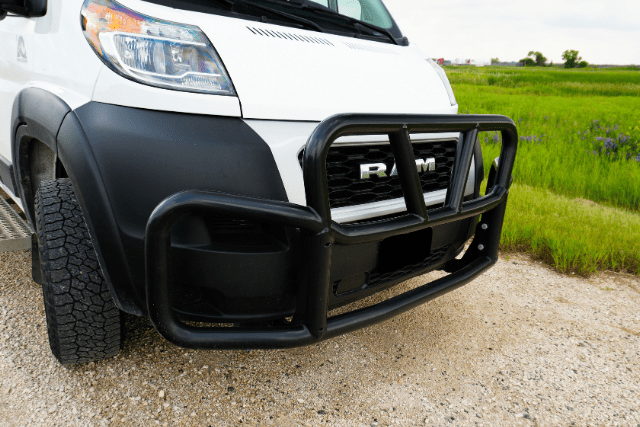
Canadian winters are tough, and you likely came to this article because you’re concerned about how the cold can impact your mobile clinic. From frozen doors to dead batteries, slippery roads, and more frequent maintenance issues, winter brings unique challenges that could disrupt your ability to deliver care.
After reading this article, you now have practical solutions to face these challenges with confidence. These upgrades can turn your mobile clinic into a reliable resource that keeps patients safe and operations smooth, even in the harshest conditions. From improving insulation and upgrading your heating system to winter-ready upgrades like the Trail Edition, you now have practical solutions to keep your clinic safe, reliable, and ready to serve.
When you choose MoveMobility, you’re investing in a mobile clinic that delivers uninterrupted, life-saving care no matter what winter brings. If you have any questions, click the button below to talk to a mobility expert. We’d love to help answer them.
If you’re not ready to chat yet, we’ve got more resources to help you learn everything you need to know about mobile clinics and how they work.
Start by checking out our article on the 10 steps to starting a mobile clinic. You’re probably also interested in what types of equipment can be installed in a mobile clinic. Read our article on mobile medical equipment to learn more about that.


